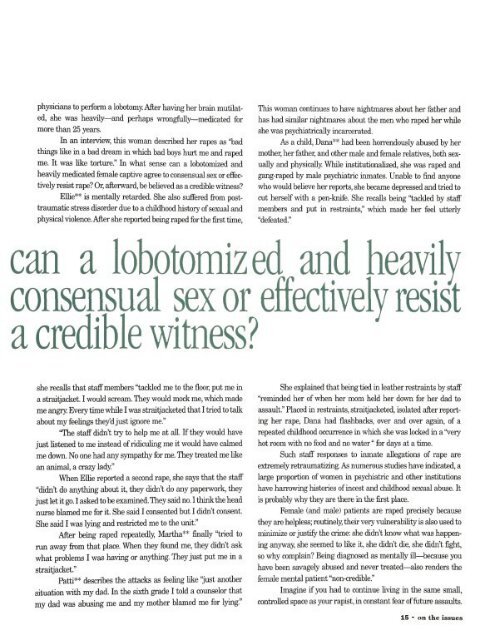women histories, incest sexual abuse. institutionalized. But what if ...
women histories, incest sexual abuse. institutionalized. But what if ...
women histories, incest sexual abuse. institutionalized. But what if ...
Create successful ePaper yourself
Turn your PDF publications into a flip-book with our unique Google optimized e-Paper software.
physicians to perform a lobotomy. After having her brain mutilated,<br />
she was heavily—and perhaps wrongfully—medicated for<br />
more than 25 years.<br />
hi an interview, this woman described her rapes as "bad<br />
things like in a bad dream in which bad boys hurt me and raped<br />
me. It was like torture." In <strong>what</strong> sense can a lobotomized and<br />
heavily medicated female captive agree to consensual sex or effectively<br />
resist rape? Or, afterward, be believed as a credible witness?<br />
Ellie** is mentally retarded. She also suffered from posttraumatic<br />
stress disorder due to a childhood history of <strong>sexual</strong> and<br />
physical violence. After she reported being raped for the first time,<br />
This woman continues to have nightmares about her father and<br />
has had similar nightmares about the men who raped her while<br />
she was psychiatrically incarcerated.<br />
As a child, Dana** had been horrendously <strong>abuse</strong>d by her<br />
mother, her father, and other male and female relatives, both <strong>sexual</strong>ly<br />
and physically While <strong>institutionalized</strong>, she was raped and<br />
gang-raped by male psychiatric inmates. Unable to find anyone<br />
who would believe her reports, she became depressed and tried to<br />
cut herself with a pen-kn<strong>if</strong>e. She recalls being "tackled by staff<br />
members and put in restraints," which made her feel utterly<br />
"defeated."<br />
can a lobotomizec. and heavily<br />
consensual sex or effectively resist<br />
a credible witness?<br />
she recalls that staff members "tackled me to the floor, put me in<br />
a straitjacket. I would scream. They would mock me, which made<br />
me angry. Every time while I was straitjacketed that I tried to talk<br />
about my feelings they'd just ignore me."<br />
"The staff didn't try to help me at all. If they would have<br />
just listened to me instead of ridiculing me it would have calmed<br />
me down. No one had any sympathy for me. They treated me like<br />
an animal, a crazy lady."<br />
When Ellie reported a second rape, she says that the staff<br />
"didn't do anything about it, they didn't do any paperwork, they<br />
just let it go. I asked to be examined. They said no. I think the head<br />
nurse blamed me for it. She said I consented but I didn't consent.<br />
She said I was lying and restricted me to the unit."<br />
After being raped repeatedly, Martha** finally "tried to<br />
run away from that place. When they found me, they didn't ask<br />
<strong>what</strong> problems I was having or anything. They just put me in a<br />
straitjacket."<br />
Patti** describes the attacks as feeling like 'just another<br />
situation with my dad. In the sixth grade I told a counselor that<br />
my dad was abusing me and my mother blamed me for lying."<br />
She explained that being tied in leather restraints by staff<br />
"reminded her of when her mom held her down for her dad to<br />
assault." Placed in restraints, straitjacketed, isolated after reporting<br />
her rape, Dana had flashbacks, over and over again, of a<br />
repeated childhood occurrence in which she was locked in a "very<br />
hot room with no food and no water" for days at a time.<br />
Such staff responses to inmate allegations of rape are<br />
extremely retraumatizing. As numerous studies have indicated, a<br />
large proportion of <strong>women</strong> in psychiatric and other institutions<br />
have harrowing <strong>histories</strong> of <strong>incest</strong> and childhood <strong>sexual</strong> <strong>abuse</strong>. It<br />
is probably why they are there in the first place.<br />
Female (and male) patients are raped precisely because<br />
they are helpless; routinely, their very vulnerability is also used to<br />
minimize or just<strong>if</strong>y the crime: she didn't know <strong>what</strong> was happening<br />
anyway, she seemed to like it, she didn't die, she didn't fight,<br />
so why complain? Being diagnosed as mentally ill—because you<br />
have been savagely <strong>abuse</strong>d and never treated—also renders the<br />
female mental patient "non-credible."<br />
Imagine <strong>if</strong> you had to continue living in the same small,<br />
controlled space as your rapist, in constant fear of future assaults.<br />
15 - on the issues

















